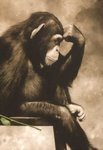
Consideration of a free will has traditionally been limited to the realms of philosophical thought or religiosity, in part, because there had been no real way to "open" the human mind and actually compare observations to the myriad of opinions collected throughout the ages. Recent investigations have been successfully mapping the movement and dynamics of the mind, linking the brain much more directly to thoughts using a variety of functional brain scanning techniques. By discovering the biological basis of thinking, researchers are shedding light in an area of science that until now has been cloaked in mystery and intrigue.
These studies have shed light on the way the mind processes sensory information and develops different perceptions, emotions, and cognitive processes. The combination of these investigations, as well as observing the effects of mental illness, accidents, an disease on the brain has revealed fascinating biological information regarding these processing functions.
When observed as a whole, the relationship between the brains capacity to gather and interpret sensory input and emotion through a "banter" between cortical and limbic regions is akin to a process, like fire. This process has been described as an "emergent" property of the mind.
Unfortunately, this has negative connotations due the attribution of magical causes- soul or "quantum" triggers as the cause for this emergence. Neuroscience is beginning to lift the veil from these mystical associations by shedding light on detailed and explainable mechanisms for the workings of the mind. Philosophy and other "theoretical" forms of interpreting the mind are falling into the realm of testability. Science has made inroads into the social topics of the humanities and this is a good thing. Theories will stand or fall on their merit.
It is likely we will discover that many great thinkers may have described many of the natural biologic mental processes in their own way, but close to the mark. Kant, for example, alluded to a kind of universal moral will he described as "The Categorical Imperative". He related free will to a "rational good will" under girded by universal moral law that only man possessed. Because man has autonomous will he is also endowed with moral values. Here there might be rumblings of such biological observations as group bonding and a form of altruism reminiscent of Dawkins selfish genes and social memes.
Another philosopher, Schopenhauer describes a more pessimistic outlook taking the extreme that the world is basically inherently evil and that "life must be some kind of mistake". Here he relates will to basic needs and polarizing selfishness and notes that the road to escaping this evil was through a compassionate approach. Again, the inklings of free will originating from the mind are associated with cooperation, another natural outgrowth of hominid evolution.
Judeo-Christian values reflect, to some extent, similar values of compassion and humility and co opt a version of free will to the effect that "God gave you free will to choose". What to choose is indoctrinated intensively from childhood and forms part of the hierarchical structure in question. Here, free will again is an inherent quality, part of a mind/soul combination. There is here perhaps a greater rift between the natural and supernatural origins of free will than the other examples, but again the seeds of the will as an intimate part of the mind is there.
The machinations of the mind/brain interaction is now being elucidated to the point we can more clearly understand consciousness as a natural emergent property of natural biological interactions. How these and other philosophical and religious interpretations hold up can be a fascinating exercise.
Massimo Pigliucci in a recent Skeptical Inquirer article discusses the increasing ability of science to describe the concept of free will as a naturalistic phenomena. He touches on Daniel Dennets naturalistic view of free will. That is, free will, is associated with biological and cultural evolution. He describes it as "the power to veto our urges and then to veto the vetoes. It is our ability to see ahead with our minds, to play in our heads several possible causal scenarios, that makes us moral agents. You don't need a miracle to have responsibility."
As the science begins to discern the relationship between consciousness, unconsciousness, and the brain, views like Dennets naturalistic theories of free will seem to be fitting observations. Free will may be more than a feeling, a reflection of unconscious actions. Pigliucci notes that what may be the difference between unconscious decision making and free will may be similar to the one between intuition and rational thinking. "What we call intuitions are really the raw results of massive, unconscious parallel processing of data, and the higher cognitive functions are in charge of filtering intuitions to eventually produce refined hypothesis about the world, which leads to further data processing and testing, and so on" thus giving us the feeling of or emergence of free will.
Chu- Carroll broaches the subject from a different angle while dismantling yet another Discovery Institute's misrepresentation of an interesting paper. Titled "Order in Spontaneous Behavior" applied sound mathematical models while analyzing fruit fly movements. The conclusions actually reflect naturalistic emergent properties of fruit flies that are not simply deterministic, but a result of a complex interplay observed in a non-linear system. That is, from a combination of dynamic interactions of sensory input and responses, the fly reacted in an unpredictable way. This may be an interesting reflection of naturalist emergent properties of the fruit fly neural system.
That free will may be a cognitive effect of normal brain function, more an illusion than some supernatural element, does not take away from the dignity, beauty, and essence of self it gives us as humans. Gaining insight into the relationship between the brain and mind will continue to be a gratifying and fulfilling exercise in the quest for understanding ourselves and our universe.




No comments:
Post a Comment